Will there be a general election before Christmas?
- Published
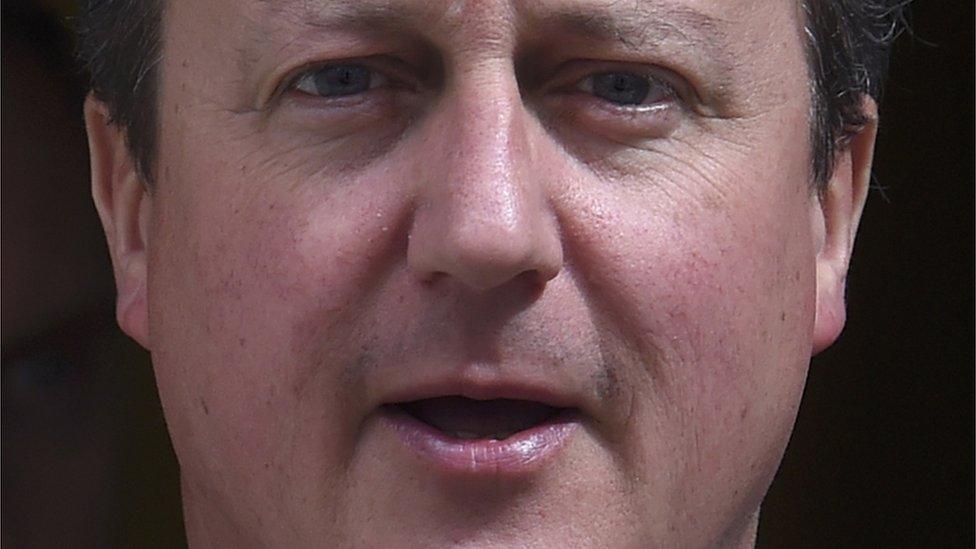
Would David Cameron stand down if he lost the EU referendum?
We few, we very few, we merry band of brothers and sisters, have felt like pigs in the proverbial.
For those who delight in the electoral process, one delight has followed another - the local, regional and mayoral elections, all but a taster for the big event, the referendum.
Last year there was a general election, the year before that the Scottish referendum.
Here's the bad news for those who aren't so happy in this electoral mud bath.
I wouldn't be at all surprised if there was a general election before Christmas.
On 24 June we will have chosen a path, and will live in a different world.
It may matter more for British politics than all the other votes rolled together.
The consequences for the economy, for policy, will matter more than shenanigans within political parties.
And the vote will have consequences for Labour and UKIP, but its greatest impact will be on the party in government.
The referendum is a binary choice: in or out, but what flows from that is the choice of those in power.
The campaign has been notable for the way it has seemed at times a private squabble in the upper echelons of the Conservative Party, vicious blue-on-blue action.
That will have massive consequences.
It is commonly accepted at Westminster that if the UK votes to leave the EU, Prime Minister David Cameron will be toast.
The debate has been whether his smoking, ruined career would last three hours - or just three seconds.
It may be slightly more complex than that.
Senior Leave Tories say, privately as well as publicly, that they would want him to stay on. Weirdly, I believe them.
It would suit them to have, for a while at least, a front man in negotiations with Brussels who was a prisoner of their design.
If there is the short-term economic chaos the prime minister has predicted, there will be those who argue it is his duty to cope with it, rather than spooking the markets even more by piling political uncertainty on top of economic jitters.
So I would expect him to set a date - as early as November or as late as next summer - when there would be a leadership election.
The Johnson factor
All eyes would be on Boris Johnson.
There are some Conservative MPs who think the campaign has stripped bare the buffoon, revealing an ambitious, unprincipled and insubstantial politician.
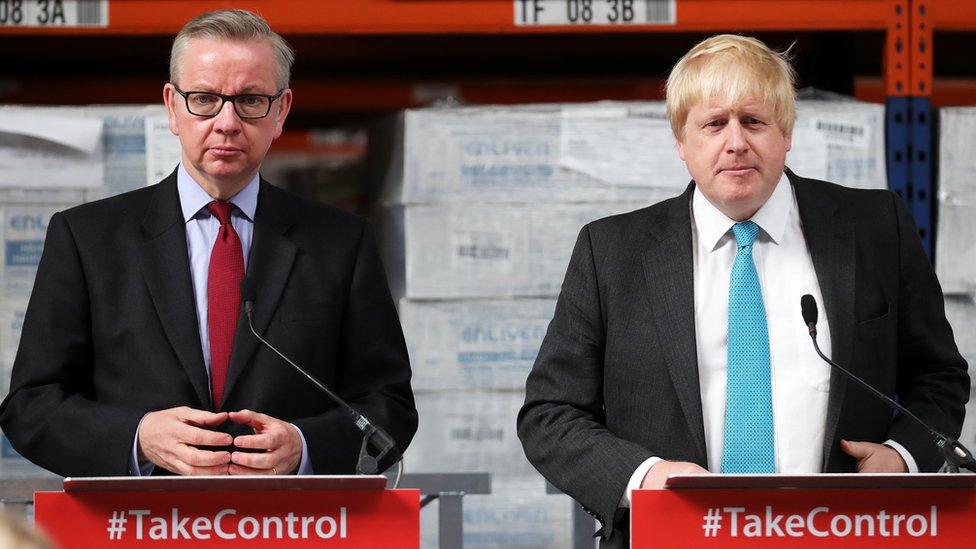
Could Michael Gove play kingmaker to a Prime Minister Boris Johnson?
To many more, he would just look like a winner.
His claim to appeal across party lines has been burnished to a high gleam.
Michael Gove would be a natural kingmaker - indeed, having worked so closely with Mr Johnson anything short of whole-hearted endorsement would make him more of a king-slayer.
In what amounts to a mini-manifesto, they have already rejected the Swiss and Norwegian models of life outside the EU.
Instead, they contend, it would be better to reject both the single market and its rules on free movement of workers.

Where leading Conservatives stand:
Remain supporters:
David Cameron: Prime Minister
George Osborne: Chancellor
Philip Hammond: Foreign Secretary
Theresa May: Home Secretary
Sajid Javid: Business Secretary
Nicky Morgan: Education Secretary
Jeremy Hunt: Health Secretary
Leave supporters:
Boris Johnson: Former London Mayor
Michael Gove: Justice Secretary
John Whittingdale: Culture Secretary
Chris Grayling: Leader of the House of Commons
Iain Duncan Smith: Former Work and Pensions Secretary
Theresa Villiers: Northern Ireland Secretary
Priti Patel: Employment Minister

If Mr Johnson becomes prime minister, there are good reasons why he might want to go to the country.
First, he has been banging on for months, about how politics should be about the sovereignty of the British people to choose policies and leaders.
If he came to Number 10 through dark deals in committee rooms, that might seem a bit rich.
There might be mutterings that people thought they had voted for five years of Mr Cameron, not some other bloke.
Secondly, during this campaign, people have cried out for certainty and clarity.
The referendum may be a black-or-white choice - but it leads to more colourful, complex multiple choice questions.
Giving people a clear indication of the implications, and a choice to vote for them at an election, might ground the government's position.
But the third reason is the most compelling.
Tail up, victorious, fresh from a triumph on the national stage, Mr Johnson might win a bigger, safer majority than the one enjoyed by Mr Cameron, if he went quickly to the country, before any predicted or unexpected disasters.
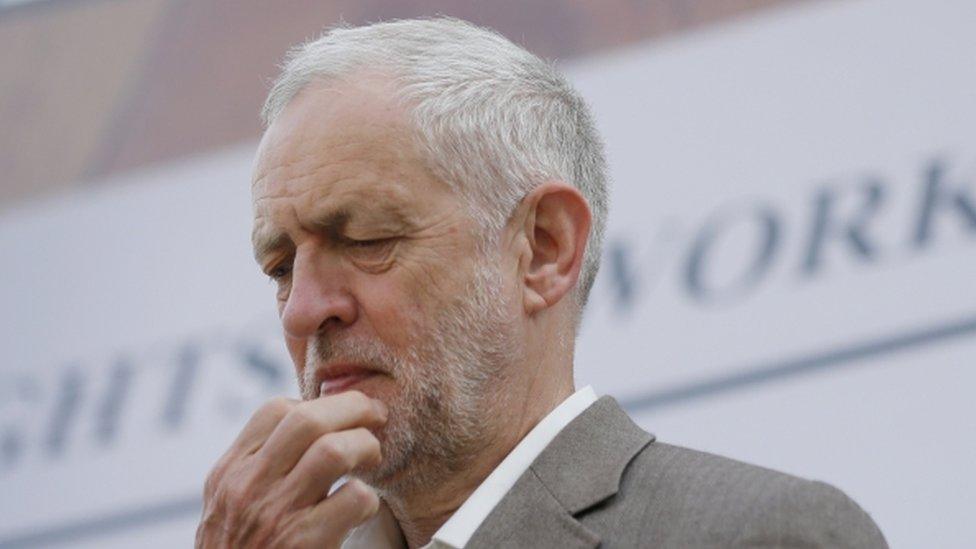
Critics say the Labour Party is currently too divided to win an election
The Labour Party is perceived as weak and divided, and few commentators think it is currently in a position to win in 2020.
Even fewer might predict victory in 2016.
The Lib Dems have not made anything like a recovery.
And, in this scenario, UKIP's dream would have been achieved and their zeal co-opted by the New Conservatives.
But, you cry, what about fixed-term parliaments?
Two-thirds of MPs would have to vote "that there shall be an early parliamentary general election".
That might put Labour and the SNP in a bit of a bind.
But, failing that, a vote of no confidence could always be engineered if the opposition looked as if they were ducking a fight.
A gamble, sure, but Mr Johnson can calculate the odds.
So that's how you get to another voting spree before the Christmas lights are up.
But what about a vote to remain in the EU?
This would be less dramatic, less shattering for the Conservatives - but the big question, as a former cabinet minister put it, would be "how to put Humpty back together again?"
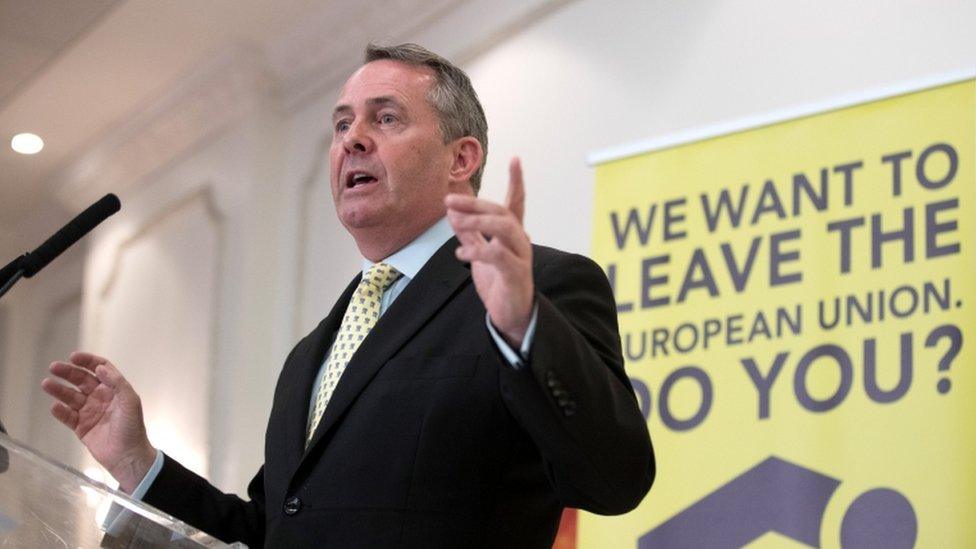
Liam Fox might make a return to front-line politics
If Mr Cameron's instinct is not to wield a cleaver, then he is not human.
But if he uses it, he is not half the politician he seems to be.
If every instinct shouts for vengeance, every calculation must scream more loudly for him to choke back the bile and exude emollient inclusiveness.
That means big jobs for Mr Gove and Mr Johnson, no culling of the lower ranks, but some rich rewards to those who reluctantly backed him, like Theresa May and Sajid Javid.
There could be a welcome back for the likes of Liam Fox. Only IDS need languish in the Out darkness.
Bad losers on the backbenches will nevertheless plot and harry the government's programme, making for awkward days ahead.

Current make-up of parliament:
Total MPs: 650
Conservative: 330
Labour: 229
SNP: 54
Liberal Democrats: 8
Others: 29
Government working majority: 17

But the problem goes well beyond personality.
If Labour strategists have any sense, they are already auditioning photogenic hamsters and pythons for their next election poster, after Sir John Major's declaration, external that the NHS would not just be unsafe in the hands of Mr Gove and Mr Johnson but would die in their rapacious gullet.
This pre-eminent pair have declared the most respected economic institutions in the world are not to be trusted and are part of an ominous global elite.
They have all but said Treasury figures are worthless.
More importantly, they have been pretty explicit that the prime minister has eroded trust in politics, broken his promises, and, implicitly, lied.
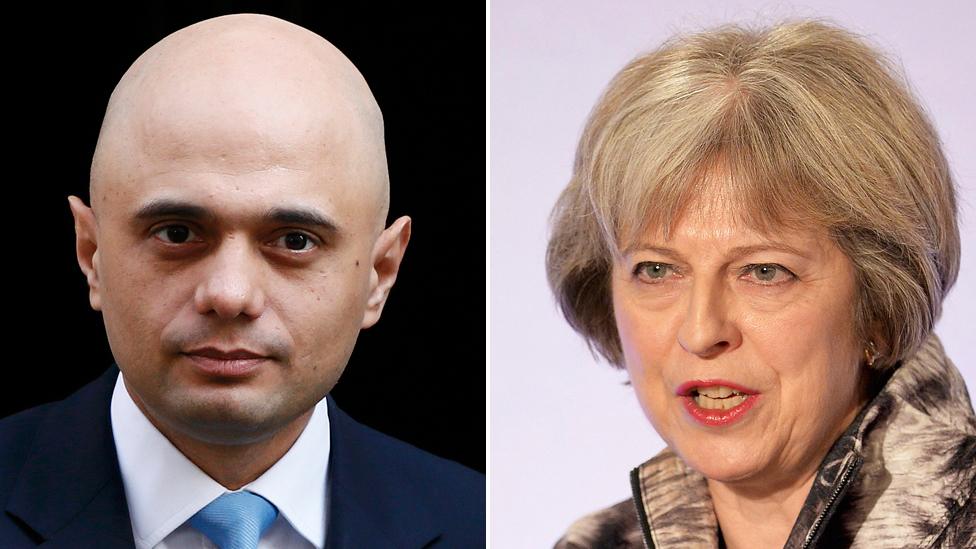
Sajid Javid and Theresa May could benefit from backing Remain
Come to that, he has said much the same about them.
This is not about them finding a way to trust each other again.
Politicians know other politicians say stuff to win an argument.
It is about us trusting them.
It is about them defusing the ammunition they have handed, gratis, to their opponents.
It is about them trying to put to sleep their own allegation that you can spot members of this government by the trail of broken promises they leave behind.
Nor is this abstract.
The Conservatives' immigration policy has been left tattered by this debate and would need an urgent overhaul at least so Mr Gove and Mr Johnson could stand on a manifesto containing promises about it.
Given that we know Mr Cameron won't be leading the Conservatives into the next election, perhaps this is all just a gentler, slower motion version of what happens after a Leave vote.
The one thing I wouldn't put money on is no election before 2020.